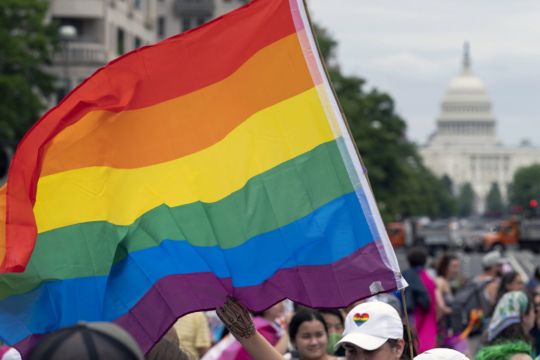The US House of Representatives overwhelmingly approved legislation to protect same-sex and interracial marriages amid concerns the Supreme Court ruling overturning Roe v Wade abortion access could jeopardise other rights.
Democrats argued intensely and often personally in favour of enshrining marriage equality in federal law, while Republicans steered clear of openly rejecting gay marriage.
Instead, leading Republicans portrayed the bill as unnecessary amid other issues facing the nation.
Tuesday’s election-year roll call, 267-157, was partly political strategy, forcing all House members, Republicans and Democrats, to go on the record.
It also reflected the legislative branch pushing back against an aggressive court that has raised questions about revisiting other apparently settled US laws.
Wary of political fallout, GOP leaders did not press their members to hold the party line against the bill, aides said. In all, 47 Republicans joined all Democrats in voting for passage.
“For me, this is personal,” said Democrat Mondaire Jones, who said he was among the openly gay members of the House.
“Imagine telling the next generation of Americans, my generation, we no longer have the right to marry who we love,” he said. “Congress can’t allow that to happen.”

While the Respect for Marriage Act easily passed the House with a Democratic majority, it is likely to stall in the evenly split Senate, where most Republicans would probably join a filibuster to block it.
It is one of several bills, including those enshrining abortion access, that Democrats are proposing to confront the court’s conservative majority.
Another bill, guaranteeing access to contraceptive services, is set for a vote later this week.
In a notable silence, Senate Republican leader Mitch McConnell declined to express his view on the bill, leaving an open question over how strongly his party would fight it, if it should come up for a vote in the upper chamber.
Key Republicans in the House have shifted in recent years on the same-sex marriage issue, including Liz Cheney of Wyoming, who joined those voting in favour on Tuesday.
Polling shows a majority of Americans favour preserving rights to marry, regardless of sex, gender, race or ethnicity, a long-building shift in modern times towards inclusion.
Approval of interracial marriage in the US hit a six-decade high at 94 per cent in September, according to Gallup.
Ahead of Tuesday’s voting, a number of lawmakers joined protesters demonstrating against the abortion ruling outside the Supreme Court, which sits across from the Capitol and remains fenced off for security during tumultuous political times.
Capitol Police said among those arrested were 16 members of Congress.
Republicans insisted the court was only focused on abortion access in June when it struck down the nearly 50-year-old Roe v Wade ruling, and they argued that same-sex marriage and other rights were not threatened.
In fact, almost none of the Republicans who rose to speak during the debate directly broached the subject of same-sex or interracial marriage.
“We are here for a political charade, we are here for political messaging,” said Jim Jordan of Ohio, the top Republican on the Judiciary Committee.
As several Democrats spoke of inequalities they said they or their loved ones had faced in same-sex marriages, the Republicans talked about rising gas prices, inflation and crime, including recent threats to justices in connection with the abortion ruling.
The Respect for Marriage Act would repeal a law from the Clinton era that defines marriage as a heterogeneous relationship between a man and a woman.
It would also provide legal protections for interracial marriages by prohibiting any state from denying out-of-state marriage licences and benefits on the basis of sex, race, ethnicity or national origin.
The 1996 law, the Defence of Marriage Act, had basically been sidelined by Obama-era court rulings, including Obergefell v Hodges, which established the rights of same-sex couples to marry nationwide, a landmark case for gay rights.
But last month, writing for the majority in overturning Roe v Wade, Justice Samuel Alito argued for a more narrow interpretation of the rights guaranteed to Americans, noting that the right to an abortion was not spelled out in the Constitution.
In a concurring opinion, Justice Clarence Thomas went further, saying other rulings similar to Roe, including those around same-sex marriage and the right for couples to use contraception, should be reconsidered.







